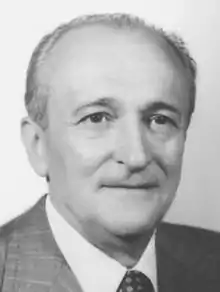1987 Italian Senate election in Lombardy
Lombardy elected its tenth delegation to the Italian Senate on June 14, 1987. This election was a part of national Italian general election of 1987 even if, according to the Italian Constitution, every senatorial challenge in each Region is a single and independent race.
| |||||||||||||||||||||||||||||||||||||
All 48 Lombard seats to the Italian Senate | |||||||||||||||||||||||||||||||||||||
|---|---|---|---|---|---|---|---|---|---|---|---|---|---|---|---|---|---|---|---|---|---|---|---|---|---|---|---|---|---|---|---|---|---|---|---|---|---|
| |||||||||||||||||||||||||||||||||||||
| |||||||||||||||||||||||||||||||||||||
The election was won by the centrist Christian Democracy, as it happened at national level. Seven Lombard provinces gave a majority or at least a plurality to the winning party, while the agricultural Province of Pavia and Province of Mantua preferred the Italian Communist Party.
Background
Bettino Craxi's Italian Socialist Party reduced its gap with the Italian Communist Party after Enrico Berlinguer's death. Later after the USSR end the PCI lost his leftist wing, including senators Armando Cossutta and Luigi Meriggi, which created the Communist Refoundation Party. Many minor parties obtained a seat: between them, for the first time, Umberto Bossi's Lega Lombarda (Lega Nord since 1991).
Electoral system
The electoral system for the Senate was a strange hybrid which established a form of proportional representation into FPTP-like constituencies. A candidate needed a landslide victory of more than 65% of votes to obtain a direct mandate. All constituencies where this result was not reached entered into an at-large calculation based upon the D'Hondt method to distribute the seats between the parties, and candidates with the best percentages of suffrages inside their party list were elected.
Results
| Party | votes | votes (%) | seats | swing |
|---|---|---|---|---|
| Christian Democracy | 1,845,626 | 34.4 | 18 | |
| Italian Communist Party | 1,319,356 | 24.6 | 12 | |
| Italian Socialist Party | 901,296 | 16.8 | 8 | |
| Italian Social Movement | 249,470 | 4.7 | 2 | = |
| Italian Republican Party | 217,157 | 4.1 | 2 | |
| Federation of Green Lists | 139,573 | 2.6 | 1 | |
| Lega Lombarda | 137,276 | 2.6 | 1 | |
| Radical Party | 133,181 | 2.5 | 1 | = |
| Italian Democratic Socialist Party | 127,828 | 2.4 | 1 | |
| Italian Liberal Party | 124,418 | 2.3 | 1 | |
| Proletarian Democracy | 108,990 | 2.0 | 1 | |
| Others | 56,617 | 1.1 | - | = |
| Total parties | 5,360,788 | 100.0 | 48 | = |
Sources: Italian Ministry of the Interior
Constituencies
- No senator obtained a direct mandate. Please remember that the electoral system was, in the other cases, a form of proportional representation and not a FPTP race: so candidates winning with a simple plurality could have (and usually had) a candidate (usually a Christian democrat) with more votes in their constituency.
Substitutions
- Walter Fontana for Monza (32.8%) replaced Francesco Rebecchini in 1988. Reason: death.
- Andrea Margheri for Monza (25.1%) replaced Antonio Taramelli in 1989. Reason: death.
- Maria Paola Colombo for Varese (31.0%) replaced Ernesto Vercesi in 1991. Reason: death.
- Giovanni Valcavi for Varese (17.9%) replaced Antonio Natali in 1991. Reason: death.
- Bruno Pellegrino for Milan 3 (17.4%) replaced Giovanni Valcavi in 1991. Reason: resignation.
- Pietro Fiocchi for Lecco 3 (5.9%) replaced Giovanni Malagodi in 1991. Reason: death.
- Mario Viganò for Pavia (30.8%) replaced Enzo Berlanda in 1992. Reason: resignation.
Notes
- Incumbent MP Mario Capanna helped his party running for this seat. However, according to the Italian Constitution, MPs can't be senators, so he ceded his senatorial seat to his party-mate Guido Pollice.
.jpg.webp)

